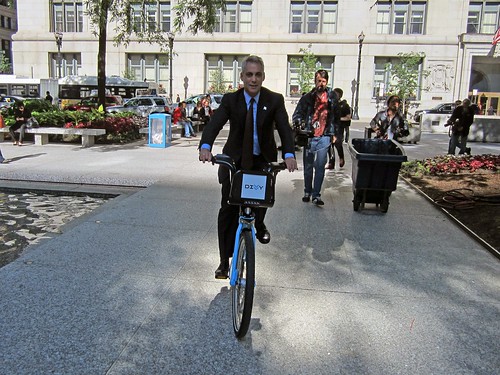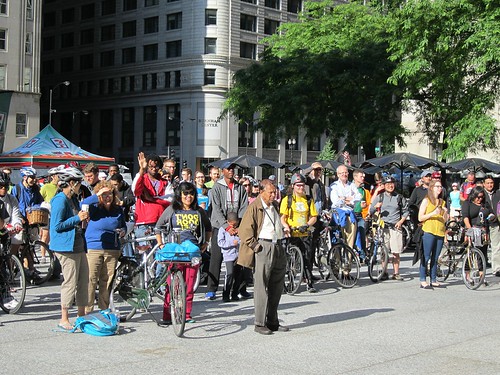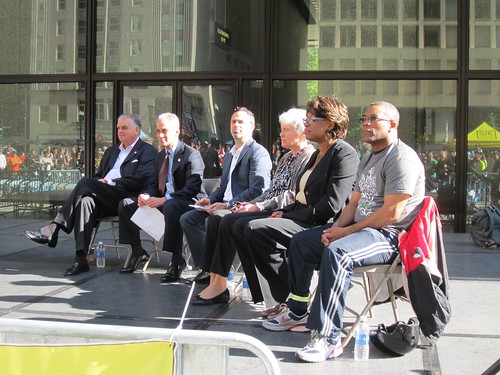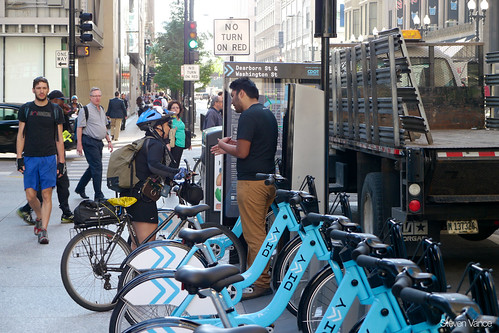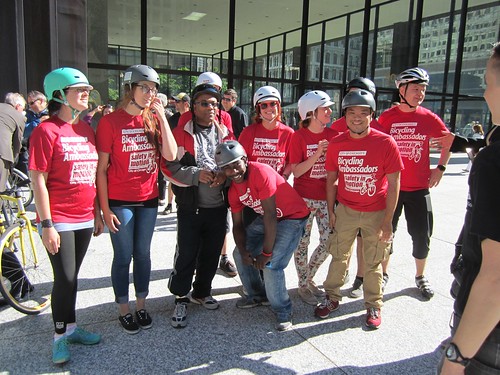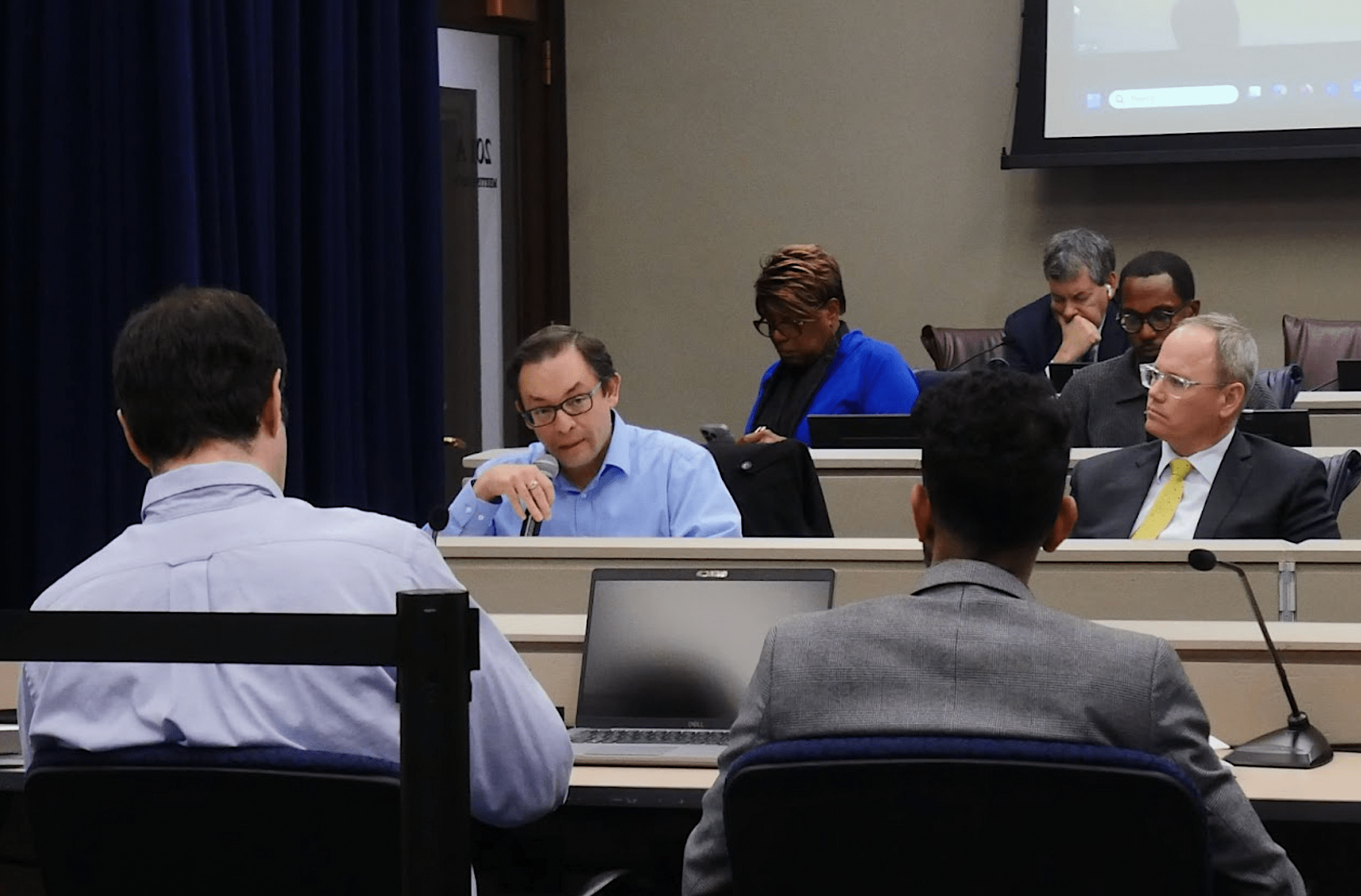The annual Bike to Work Rally serves as a state of the union for Chicago cycling, and this year there’s a lot of news to report, with the impending launch of the Divvy bike-share system, completion of the Milwaukee protected lanes, and financing secured for the Chicago Riverwalk. This was the first time Mayor Rahm Emanuel has appeared at the rally and he seemed to enjoy soaking in the crowd’s enthusiasm for the many bike initiatives that have launched since he took office about two years ago.
Transportation Commissioner Gabe Klein kicked off the speeches by announcing the recipients of the Mayor’s Bike Advisory Council Awards. Commissioner Rosemary Krimbel of the Department of Business Affairs Consumer Protection was recognized for helping to develop anti-dooring stickers for cabs. Brian Bonanno from the Andersonville Development Corporation has helped get a People Spot parklet and two on-street bike parking corrals installed on Clark Street, with four more corrals and another parklet debuting this summer. Longtime bike activist Kathy Schubert was recognized for her letter-writing campaign that resulted in metal-grate bridges being retrofitted with non-slip “Kathy plates.”
Klein said he rode to the rally in his suit. “It’s to send a message: you can wear a suit and bike to work,” he said, an apparent dig at the Trib’s Jon Hilkevitch, who recently questioned whether such a thing was possible.
The commissioner heralded the opening of the Milwaukee lanes. “That would not have happened – it wouldn’t have happened this quick – without our mayor,” he said. “Every time I met with him he said, 'The bike plan looks great, but what about Milwaukee Avenue, when are you doing that?' And so with his support and leadership and pushing me, we got that done for Bike to Work Week. I’m really proud of that.”
He outlined how the new bike-share system will work for Chicagoans. “If you need to go to work: Divvy. If you’re jumping off the CTA, need to get that last mile to your destination: Divvy. If you have friends visiting and want to show them Chicago and go from point to point to point: Divvy. So Divvy is for everyone and anyone that needs to get somewhere.”
When the mayor took the mic, he had an additional suggestion. “In case you have family come visit and you want to get them out of the house: Divvy. Yes, you can go see our neighborhoods, but get out my house, man, you’re driving me crazy at this point.”
Touting the riverwalk funding, Emanuel thanked his personal friend, outgoing U.S. Transportation Secretary Ray LaHood, visiting from Washington. “None of this, bike-sharing program, bike lanes, would be possible if it wasn’t for the support of Secretary of Transportation Ray LaHood,” Emanuel said.
The mayor argued that building a bike-friendly city attracts technology startups whose young employees don’t want to rely of cars for transportation. “Having protected bike lanes and encouraging biking as a form of transportation has also encouraged another part of the economy to take hold and take root here in the city of Chicago,” he said. “We are providing 7,000 digital jobs that have started up, just in the River North area alone.” Emanuel also said he’s proud that Divvy program will include an apprentice program for 100 low-income teens that will teach them bike mechanics and job skills.
The mayor closed by noting that bike improvements are part of his bigger plan to provide a range of viable transportation options. “Yes we are building a new Red Line and we are also building new stations throughout the city,” he said. “We’re buying new buses and trains. But a modern city is also opening up a new form of transportation, and that is biking to work and making the bike lanes and bike culture part of the public transportation system of the city of Chicago.”
An energized LaHood said he’s witnessed the success of Capital Bikeshare in D.C., and Chicagoans should expect similar results with Divvy. “Get ready Chicago,” he said. “People are going to take advantage of Divvy. You’re going to see cyclists all over the city… This will really put Chicago on the map.”
LaHood also stressed the importance of improving safety for cyclists. “We know that cyclists pay attention,” he said. “They know the rules of the road. We want to persuade those people in cars to be respectful of cyclists. Make sure that you give them their right-of-way. Yield to them, give them the opportunity to cycle safely… Now that Chicago is going to be one of the largest cycling cities in America, we need to continue to emphasize safety. Wear those helmets and be respectful, but the people who are driving those cars need to be respectful of cyclists also.”
Active Transportation Alliance Director Ron Burke noted that, under Emanuel, Chicago has reached cycling milestones that would have seemed far-fetched a few years ago. “If you had been at this rally in 2009 or 2010 and someone had said to you, ‘Hey folks, we’re going to have a protected bike lane all the way through the Loop on Dearborn…We’re going to have protected bike lanes on the South Side, the West Side, the North Side, we’re going to have one of the largest bike-share programs in the country, and that’s all going to happen in three years,’ I think you might have said, ‘Whoa! Slow down! You’re maybe a little too ambitious here.’ No. It’s happening, it’s happened, it’s here.”
